
PHILOSOPHICAL STUDIES
Scope & Guideline
Elevating Ideas, Inspiring Dialogue
Introduction
Aims and Scopes
- Epistemology and Knowledge Theory:
Explores the nature, scope, and limits of knowledge, addressing issues like belief formation, rationality, and the epistemic circularity of concepts. - Metaphysics and Ontology:
Investigates fundamental questions about existence, reality, and the nature of objects, often drawing on historical figures like Brentano and Frege. - Philosophy of Language and Logic:
Examines the relationship between language and thought, including the implications of linguistic frameworks on philosophical discourse. - Ethics and Moral Philosophy:
Engages with moral reasoning, the nature of ethical beliefs, and the implications of epistemology for moral judgment. - Philosophy of Mind and Consciousness:
Focuses on the nature of mental states, consciousness, and the interplay between cognitive processes and philosophical inquiry. - Historical Philosophical Analysis:
Critically appraises historical philosophical texts and figures, linking contemporary philosophical issues with their historical contexts.
Trending and Emerging
- Digital and Virtual Philosophies:
Emerging discussions around digital realities and virtual worlds highlight the intersection of technology and philosophical inquiry, addressing how these developments affect traditional philosophical problems. - Pragmatism and Epistemic Agency:
There is a noticeable increase in research focusing on pragmatism, especially regarding epistemic agency and how beliefs can be formed and justified in practical contexts. - Interdisciplinary Approaches to Philosophy:
Collaborative work that bridges philosophy with cognitive science, linguistics, and artificial intelligence is on the rise, reflecting a trend towards more integrated philosophical discourse. - Philosophy of Emotions and Affective States:
An increased interest in the philosophical implications of emotions and their role in rationality and moral judgment suggests a burgeoning field that connects ethics with psychological insights. - Critical Examination of Historical Philosophers:
A renewed emphasis on critically examining historical philosophers, such as Wittgenstein and Brentano, is prevalent, indicating a desire to reinterpret and apply their ideas to contemporary issues.
Declining or Waning
- Classical Logic and Traditional Formalism:
Papers focusing on classical logic frameworks and traditional formalist approaches have decreased, as contemporary discussions increasingly favor alternative logical systems and informal reasoning. - Austrian Philosophy Specificity:
The specificity of Austrian philosophical themes, particularly those centered around figures like Ayer or early 20th-century Austrian thinkers, seems to be receiving less attention, possibly overshadowed by broader analytic philosophy. - Reductionist Metaphysical Approaches:
The trend towards reductionist metaphysics appears to be waning, with more philosophers advocating for non-reductionist views that embrace complexity in metaphysical discussions. - Analytical Philosophy of Science:
While still a significant area, the focus on analytical philosophy of science has diminished, as interdisciplinary approaches gain traction, integrating philosophy with empirical sciences more broadly.
Similar Journals
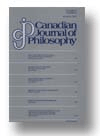
CANADIAN JOURNAL OF PHILOSOPHY
Exploring the Depths of Contemporary PhilosophyCanadian Journal of Philosophy, published by Cambridge University Press, stands as a pinnacle of scholarly discourse in the field of philosophy. With its ISSN 0045-5091 and E-ISSN 1911-0820, this esteemed journal has cemented its reputation since its inception in 1971, continuing to engage with contemporary philosophical issues up to 2024. The journal is highly regarded, currently holding a Q1 rank in Philosophy and positioned in the 89th percentile of its category according to Scopus rankings. Its focus is on advancing philosophical inquiry, offering a platform for both established scholars and emerging voices to share significant research, critique, and innovative ideas. While the journal is not open access, it provides essential insights that are invaluable for researchers, professionals, and students alike, fostering an environment of intellectual exchange and growth in the philosophical community.

REVUE INTERNATIONALE DE PHILOSOPHIE
Navigating the Complexities of ThoughtREVUE INTERNATIONALE DE PHILOSOPHIE, published by REVUE INT PHILOSOPHIE, is a prestigious journal in the field of philosophy, based in Belgium. With an ISSN of 0048-8143 and an E-ISSN of 2033-0138, this journal has been a vital platform for philosophical discourse since its inception in 1983, successfully evolving through various phases until 2024. Despite currently being positioned in the Q4 category of Philosophy according to the 2023 rankings, it serves as an important venue for scholars and students alike, allowing for a diverse exploration of philosophical thought. Although it is not an Open Access publication, the journal fosters a rich environment for rigorous scholarly research and debate. By presenting articles that challenge and inspire, REVUE INTERNATIONALE DE PHILOSOPHIE ensures that it remains an essential resource for anyone engaged in philosophical inquiry.

SYNTHESE
Unveiling insights that shape our understanding of social issues.SYNTHESE is a prestigious academic journal published by Springer, renowned for its contributions to the fields of Philosophy and Social Sciences. With a distinguished history dating back to its inception in 1936, this journal continues to thrive, offering a platform for innovative and critical discourse. Recognized for its excellence, SYNTHESE holds a remarkable Q1 quartile ranking in both Philosophy and Social Sciences (miscellaneous) as of 2023, placing it within the top tier of scholarly publications. Its impressive Scopus rankings further underscore its influence, boasting a rank of #48 out of 806 in Philosophy and #70 out of 275 in General Social Sciences, thereby reflecting a 94th percentile in the arts and humanities. The journal's scope encompasses a wide array of interdisciplinary and philosophical inquiries, making it a vital resource for researchers, professionals, and students seeking to deepen their understanding of complex social issues. With access options that promote scholarly connectivity, SYNTHESE is committed to advancing knowledge and fostering intellectual engagement within the global academic community.
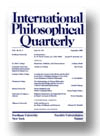
INTERNATIONAL PHILOSOPHICAL QUARTERLY
Unraveling Contemporary Philosophical ChallengesINTERNATIONAL PHILOSOPHICAL QUARTERLY, published by the PHILOSOPHY DOCUMENTATION CENTER, stands as a vital resource for scholars and practitioners engaged in philosophical inquiry. With an ISSN of 0019-0365 and an E-ISSN of 2153-8077, this esteemed journal has published thought-provoking discussions and analyses in philosophy since its inception in 1974. The journal is housed in the United States at PO BOX 7147, CHARLOTTESVILLE, VA 22906-7147, and has shown a commitment to advancing philosophical debates across its converged years from 1974 to 2023. Recognized with a Q3 rating in the philosophy category for 2023, it ranks 511 out of 806 within Scopus, positioning it within the 36th percentile of its peers. Although not an open-access publication, it continues to offer critical insights that foster scholarly dialogue and research within the field. This journal is especially pertinent to researchers, professionals, and students who seek to deepen their understanding of contemporary philosophical issues and engage with a diverse array of philosophical perspectives.
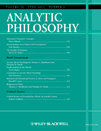
Analytic Philosophy
Navigating the Complexities of Analytic Philosophical DiscourseAnalytic Philosophy is a prestigious journal published by Wiley, dedicated to advancing critical discourse in the realm of philosophy. With an ISSN of 2153-9596 and an E-ISSN of 2153-960X, this journal has rapidly established itself as a vital resource for researchers, professionals, and students seeking to explore contemporary philosophical debates and analytic methods. Operating from the heart of the United States, located at 111 River St, Hoboken, NJ, it holds an impressive Q1 classification in the field of philosophy for 2023, ranking #190 out of 806 within Scopus's Arts and Humanities category, placing it in the top 76th percentile. The journal’s commitment to rigor and innovation makes it an essential platform for thought-provoking research and discussions in analytic philosophy. Researchers will appreciate the journal’s high standards and its significant impact within the academic community.

Philosophies
Empowering scholars to share their philosophical journeys.Philosophies is a leading open-access journal published by MDPI, dedicated to advancing research in the fields of Philosophy and the History and Philosophy of Science. Established in 2016 and located in Switzerland, this journal aims to stimulate scholarly dialogue and innovation by providing a platform for diverse philosophical perspectives and interdisciplinary approaches. With a commendable impact factor and ranking—Q2 in both Philosophy and History and Philosophy of Science in 2023—Philosophies stands out in the academic community with Scopus rankings placing it in the top tiers of its categories (Rank #176/806 in Philosophy and Rank #65/223 in History and Philosophy of Science). Authors and researchers are encouraged to submit their works as this journal continues to foster open access to knowledge, enabling global dissemination and collaboration among experts and enthusiasts alike. Join us in exploring the profound questions that shape our understanding of the world and human experience.

Teorema
Bridging classical concepts with modern challenges.Teorema is a distinguished academic journal within the realm of Philosophy, published by KRK EDICIONES in Spain. With an ISSN of 0210-1602, this journal has consistently contributed to the philosophical discourse since its inception in 2008, with a planned continuation until 2024. Recognized for its rigorous peer-review process and quality research, Teorema holds an esteemed position in the Scopus ranking, placed in the 57th percentile of Arts and Humanities philosophy journals, and categorized in Q3 for 2023. This journal serves as a platform for researchers, professionals, and students to engage with innovative philosophical ideas and debates, fostering a deeper understanding of key concepts and contemporary issues. While it does not offer open access to its content, Teorema remains an indispensable resource for those committed to the advancement of philosophical scholarship.
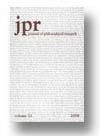
Journal of Philosophical Research
Nurturing Critical Perspectives in Modern PhilosophyThe Journal of Philosophical Research, published by the PHILOSOPHY DOCUMENTATION CENTER, stands as a significant conduit for scholarly dialogue in the field of philosophy. With the ISSN 1053-8364 and E-ISSN 2153-7984, this journal has been instrumental in fostering academic discourse from its inception in 2002. Although not open access, it maintains a robust reputation, evidenced by its Q3 ranking in the philosophy category for 2023 and a commendable position in the Scopus Ranks (Rank #287 out of 806) reflecting the journal's impact factor in the arts and humanities. The journal's rigorous selection process ensures the publication of high-quality, peer-reviewed articles covering a broad spectrum of philosophical inquiries, making it an essential resource for researchers, professionals, and students alike. Situated in Charlottesville, Virginia, it exemplifies the commitment to advancing philosophical understanding and scholarship, while serving as a valuable repository of contemporary philosophical thought.
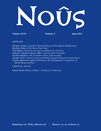
NOUS
Elevating critical thought to new heights.NOUS is a prestigious academic journal published by WILEY, specializing in the field of Philosophy. Since its inception in 1989, it has maintained a strong reputation within the philosophical community, currently earning a remarkable position in the top quartile (Q1) of its category as of 2023. With an impressive Scopus ranking of #22 out of 806 in the Arts and Humanities – Philosophy category, and achieving a 97th percentile, NOUS serves as a pivotal platform for scholarly discourse, innovative research, and critical thinking. The journal prioritizes high-quality articles that contribute significantly to various philosophical debates, thereby attracting both established and emerging scholars. Although it does not offer an open access option, NOUS is a crucial resource for anyone engaged in serious philosophical inquiry and is dedicated to advancing knowledge and understanding in this rich field.

Filosofskii Zhurnal
Fostering Interdisciplinary Dialogue in the HumanitiesFilosofskii Zhurnal, published by the esteemed Russian Academy of Sciences - Institute of Philosophy, is a renowned academic journal focused on the vibrant fields of Philosophy, Cultural Studies, History and Philosophy of Science, and Linguistics. With an ISSN of 2072-0726 and an E-ISSN of 2658-4883, this esteemed publication has been a pivotal source of scholarly discourse since its inception in 2019, with converged years extending through 2024. Holding a distinguished Q2 quartile ranking in several disciplines, the journal is instrumental in advancing knowledge and research within its realms, making significant contributions to the understanding of philosophical thought, cultural dynamics, and language interpretation. Although it does not currently offer open access options, the journal maintains a strong presence in Scopus with notable rankings, including its position at #490/806 in Philosophy and #837/1304 in Cultural Studies. By providing a platform for original research, critical reviews, and interdisciplinary dialogue, Filosofskii Zhurnal serves as a valuable resource for researchers, professionals, and students seeking to deepen their understanding of philosophical inquiry and related fields.